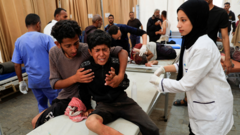In the wake of Israeli airstrikes, Tehran’s inhabitants grapple with deep emotional turmoil, expressing anxiety over potential devastation and the impact of foreign intervention, while yearning for a return to peace.
Tehran on Edge: Citizens Speak Amid Ongoing Israeli Strikes

Tehran on Edge: Citizens Speak Amid Ongoing Israeli Strikes
As Israeli attacks on Tehran persist, residents express fear and uncertainty about their future, drawing parallels to war-torn Gaza.
Amidst the ongoing Israeli military strikes on Tehran, residents are confronting fear and confusion as the reality of conflict transforms their daily lives. Long queues at gas stations and bakeries are a common sight as people attempt to flee the capital. The situation evokes a sense of helplessness among the populace, many of whom are shocked by the rapid escalation of violence that began on Friday. A 21-year-old music student, using the pseudonym Donya, conveyed a poignant choice: “I would rather die in my own house than run away.”
She joins countless others who express a desperate wish not to see their beloved Tehran turn into a warzone like Gaza. Emotions run high, with a complex mix of defiance against the Iranian regime and a rejection of external interventions, particularly from Israel. "We don't want Israeli soldiers to 'save' us," she stated, reflecting a broader sentiment of national pride juxtaposed with personal fear.
Initially, some residents felt a strange satisfaction at the targeting of powerful Iranian military figures. However, their feelings shifted dramatically upon learning of civilian casualties, with one woman lamenting the loss of ordinary individuals who resembled her and seemingly bore no connections to the conflicts.
As the conflict escalates, Iranian authorities report that over 220 individuals, including women and children, have died since the strikes began; meanwhile, Israeli sources indicate that at least 24 Israelis have been killed in the exchange. The environment of fear is compounded by the lack of warning systems for missile strikes and the panic incited by reports of both missile attacks and car bombs.
Anxiety leads many to stay indoors, as their daily routines are disrupted with classes postponed, and some residents finding solace in trying to locate friends and family against the backdrop of destruction. One young woman remarked on the omnipresence of danger, stating that no location in Tehran feels safe anymore.
Amid this turmoil, opinions are sharply divided. Some celebrate the weakening of the regime while others decry those who cheer for foreign attacks. The country is witnessing bitter divisions even among family members about their perspectives on the conflict, with many reassessing their positions as the humanitarian implications become overwhelming.
Meanwhile, members of the Iranian diaspora reflect on the situation with deep concern. Activist Dorreh Khatibi-Hill articulated the difficulty of conveying what Iranians endure in a time of crisis: the sensation of urgency muddled with somber acceptance of the ongoing catastrophe.
In this period of upheaval, there is a collective hope that Tehran will not succumb to the ravages of prolonged warfare like its regional neighbors. As the stakes rise, Iranians are left grappling with the ever-present fear of an uncertain future, while holding onto a glimmer of hope for peace.






















